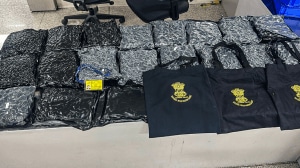Give me liberty, but not too much: This is Russia
Tanya Lokshina, a leading human rights campaigner, gathered her staff together some months ago and told them what to do if they were visited...

Tanya Lokshina, a leading human rights campaigner, gathered her staff together some months ago and told them what to do if they were visited by the secret police.
Mikhail B. Khodorkovsky, Russia’s richest man, had just been arrested by police shouting, ‘‘Everyone on the floor or we’ll shoot!’’ Among the civic organisations he helped support was Lokshina’s group, the Moscow Helsinki Group.
‘‘If you have visitors from you-know-what, don’t talk to them,’’ she said she told her staff. And then: ‘‘I’m listening to myself talk and I realised that what I was saying was being said by many people many years ago. It’s troubling. Things are starting to repeat themselves.’’
These are certainly not Soviet times and dissidents are not being jailed as they were then. But even before the arrest of Khodorkovsky, who remains in jail awaiting trial on charges of economic crimes, the air in Russia had started to grow a bit chillier under President Vladimir V. Putin.
The arrest was the strongest of a number of recent signals that the government is tightening its grip on society and becoming more unpredictable in its exercise of power.
The notable thing is the degree to which much of the public has accepted—even embraced—new limits on their freedoms. ‘‘Left to its own devices, the nation tends to be recumbent politically and subservient to its leader,’’ wrote a political commentator, Leonid Radzikhovsky, in the government-run newspaper Rossiskaya Gazeta after the presidential election last month.
Whether as a reaction to the 1990s or as a set of fundamental values, the freedoms of liberal democracy seem less precious to Russians than they do to many in the West. ‘‘I can’t imagine people being really indignant and outraged if their freedom is jeopardised,’’ said Masha Lipman, a journalist and political analyst here, in an interview in December, at the time of the parliamentary elections.
A poll taken at around that time showed that most people favour some form of news media censorship by the government. Another poll, conducted last year by Sarah E. Mendelson of the Center for Strategic and International Studies, found that just 30 per cent of Russians say democracy is always best, while 34 per cent say autocracy is ‘‘sometimes preferable’’.
Interestingly, Mendelson’s poll also found that 26 per cent of Russians would ‘‘definitely or probably’’ vote for Stalin if he were running today, while another 19 per cent seemed a little unsure, saying they would ‘‘probably not’’ vote for him.
Both of the country’s liberal democratic parties were eliminated from Parliament in the December election. In Russia today, liberal democracy is a fringe idea. The question Lokshina and others are asking is how cold is it going to get.
Over recent months, the government has moved to limit freedom of the press and the free flow of information, has neutered political opposition parties, has clamped down on scientific exchanges and has used the courts to mete out punishments and quell opposition.
When the enigmatic President was elected to a second term one month ago, many analysts said the real Putin—autocrat or closet liberal—would now stand up. So far, apart from his economic policies, he has shown little appetite for liberal government.
Putin’s achievement in his first four-year term was to consolidate power in his own hands and to bring a sense of political and economic stability at a moment when it seemed Russia might veer out of control. The legislature, the judiciary and regional governments are now his to command.
That seemed fine with voters, who elected him overwhelmingly, although he had given little indication of where he intended to lead the country.
It is a remarkable achievement. Putin is the first modern Russian leader to attain this degree of power without resorting to mass repression. In a post-midnight news conference after his re-election last month, Putin described his social contract with Russia like this: ‘‘So, we will modernise our country, we will act resolutely, but we will try to explain every step we take. So that people understand what is being done and why.’’
Putin’s successful formula has set off a vocabulary bee among political scientists: controllable democracy, managed democracy, authoritarian liberalism, liberal authoritarianism, elected autocracy, nomenclature-bureaucratic state capitalism, Czar Vladimir. Putin has put himself at the pinnacle of what he calls a ‘‘vertical of power’’ in which checks and balances have been eliminated and his word is final.
— (The New York Times)



- 01
- 02
- 03
- 04
- 05




























